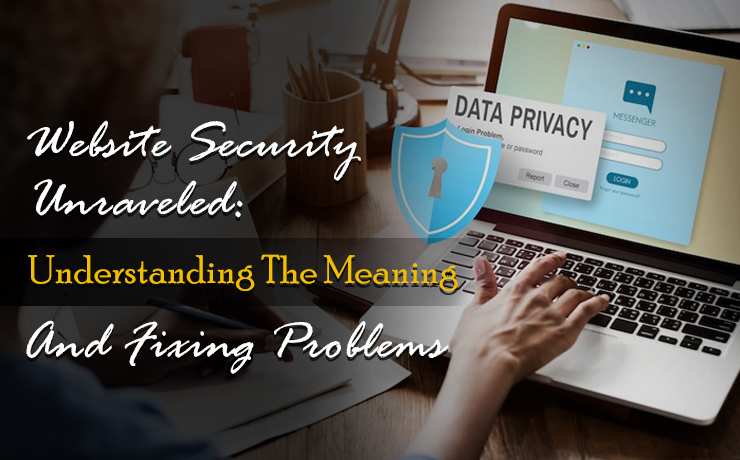Website Security Unraveled: Understanding The Meaning And Fixing Problems

Clement Foo
Senior Digital Content Manager

Website security is a paramount concern for businesses and users alike in today’s digital world. Encountering a ‘not secure’ warning on a website can deter visitors and undermine credibility. Understanding the not secure website meaning is the first step towards addressing and resolving these security warnings.
The Meaning Behind ‘Not Secure’ Website Alerts
A ‘not secure’ warning on a website typically indicates that the connection between the user’s browser and the site is not encrypted. This means that any data transferred could potentially be viewed or stolen by hackers.
Implications for User Data
Unencrypted connections put user data at risk of interception. Personal information, login details, and payment information can be compromised, leading to serious privacy breaches and potential financial loss.
Causes of Website Security Warnings
Several factors can lead to a website being labeled as not secure. Common causes include the absence of an SSL certificate, outdated security protocols, or misconfigured pages.
The Role of SSL Certificates
SSL certificates play a crucial role in website security by encrypting data transferred between servers and clients. A missing or expired SSL certificate is often the culprit behind security warnings.
How to Fix Not Secure Website in Chrome
Google Chrome, like many modern browsers, emphasizes user security by alerting users to non-HTTPS sites. Fixing this issue typically involves obtaining and correctly installing a valid SSL certificate.
Steps for SSL Certificate Installation
To secure your website, purchase an SSL certificate from a reputable authority, install it on your server, and ensure your website is configured to serve content over HTTPS.
Diagnosing and Fixing Security Vulnerabilities
Diagnosing website vulnerabilities is critical. Regularly scanning your website for security gaps and staying updated with the latest security patches are fundamental practices.
Tools for Security Assessments
Utilize security plugins and tools designed for vulnerability scanning. They can identify weak spots in your site’s security before they are exploited by attackers.
Not Secure Website Fix: Best Practices
Fixing a ‘not secure’ website involves more than just an SSL certificate. Implementing a comprehensive security strategy is necessary to protect against a range of threats.
Comprehensive Security Measures
Employ measures such as secure password policies, two-factor authentication, regular software updates, and secure hosting to fortify your website’s defenses.
Educating Your Team on Security Protocols
Human error can lead to security breaches. Educating your team on best security practices is vital for maintaining a secure online environment.
Developing a Security-Minded Culture
Cultivate a culture that values security by conducting regular training sessions on the latest security threats and safe internet practices.
The Impact of Website Security on SEO and Trust
Website security not only protects users but also affects SEO rankings and trust. Search engines prioritize secure websites, and users are more likely to engage with sites that are deemed safe.
Building Trust with Secure Connections
A secure website is a trusted website. By ensuring that your site is secure, you reinforce your brand’s reputation and build customer confidence.
Ongoing Monitoring and Response Planning
Proactive monitoring and having a response plan in place are critical for quickly addressing any security breaches that may occur.
Implementing Monitoring Solutions
Set up real-time monitoring solutions to alert you of any security issues, allowing for prompt action to mitigate risks.
Partnering with Experts for Enhanced Security
For many businesses, managing website security can be a complex task. Partnering with a digital agency like SmartSites can provide the expertise needed to ensure your website remains secure and trusted by users.
Leveraging Professional Security Services
Professional services can offer sophisticated security solutions, from SSL management to regular security audits, ensuring your website stays protected against the latest threats.
Regularly Updating and Patching
Maintaining the security of a website is an ongoing task that requires regular updates and patches to software and applications. Outdated systems are prime targets for cyber-attacks, making it critical to apply security updates as soon as they become available.
Prioritizing Updates Across Your Digital Assets
Staying on top of updates for your content management system (CMS), plugins, and third-party applications can significantly reduce vulnerabilities. It is also important to regularly backup your website so that in the event of a security breach, you can restore your website to a secure state.
Securing Your Online Presence
The ‘not secure’ website meaning should be a call to action for any business operating online. By understanding the risks, implementing fixes, and adopting ongoing security measures, businesses can protect their website, their customers, and their reputation.
 Free
Consultation
Free
Consultation Free
Google Ads Audit
Free
Google Ads Audit







